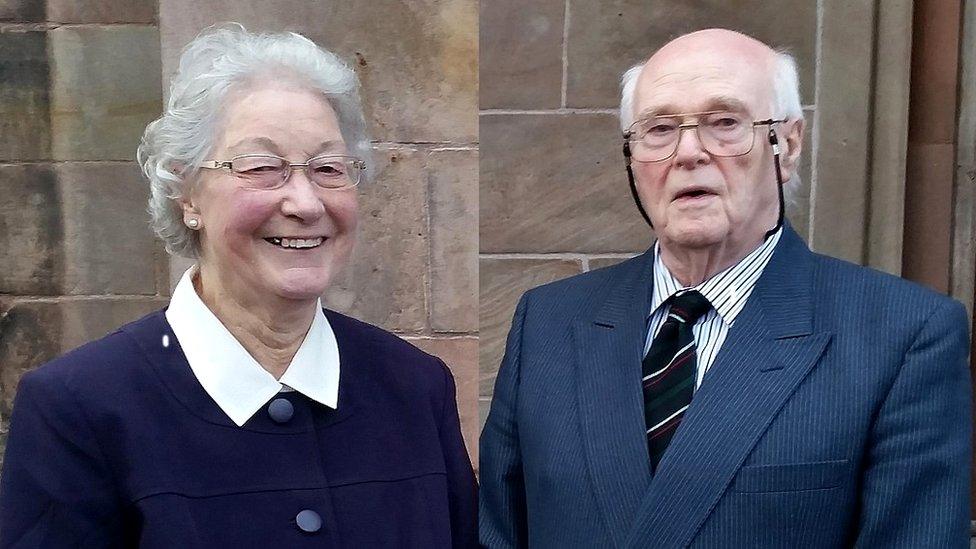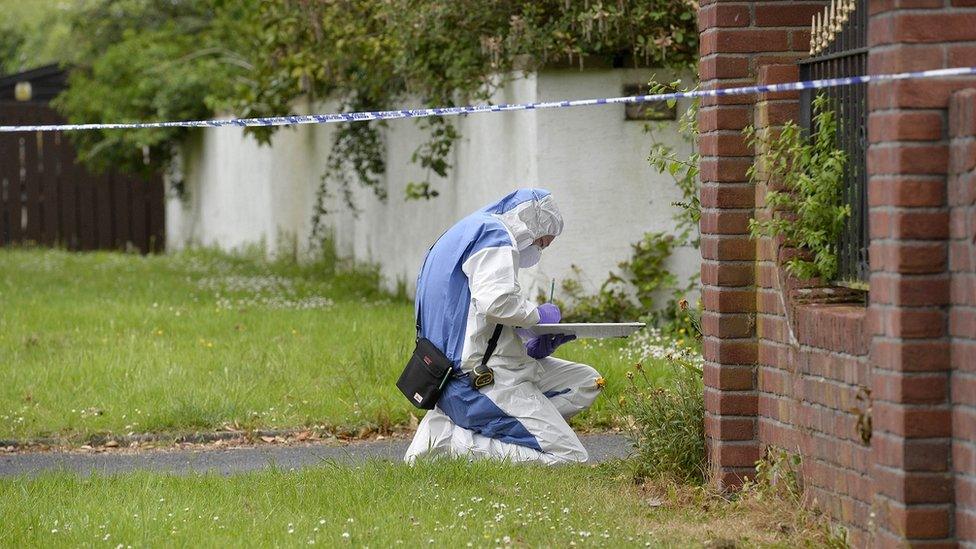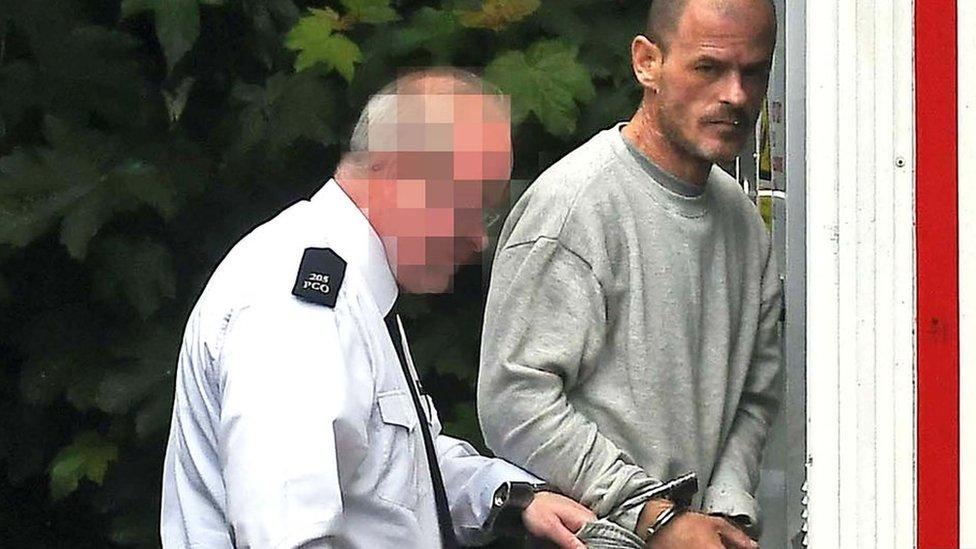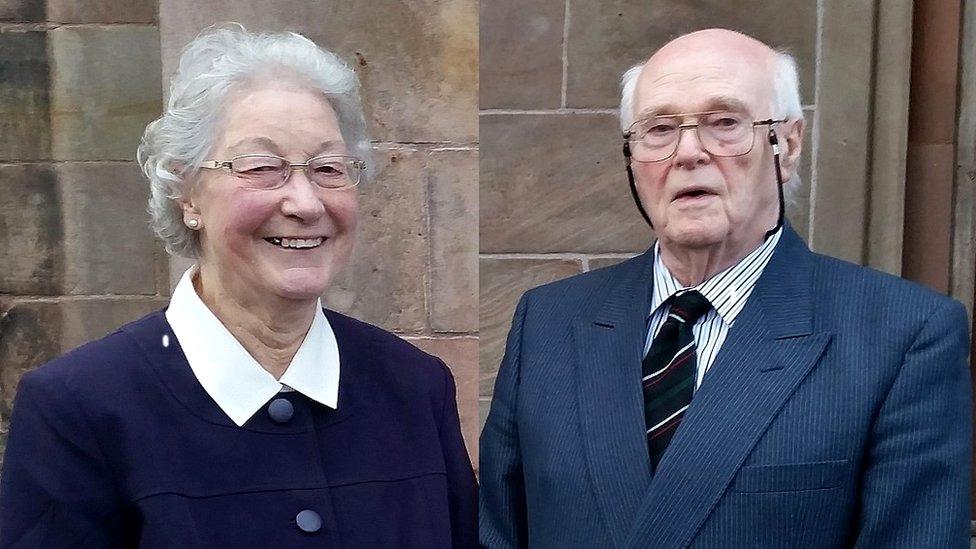Cawdery killer handcuffed but not arrested before attacks
- Published

Marjorie and Michael Cawdery were killed in a stabbing at their home in Portadown in 2017
A man who stabbed an elderly couple to death in their home had earlier that day been hit, pinned to the ground, handcuffed but not arrested outside Daisy Hill Hospital in Newry, an inquest has heard.
Michael and Marjorie Cawdery, both 83, were killed in a "frenzied attack" in their County Armagh home in May 2017.
Their killer, Thomas Scott McEntee, was suffering from paranoid schizophrenia.
He was sentenced to a minimum of 10 years in prison in 2018.
The inquest heard today that on the day of the killing, McEntee was handcuffed following a police pursuit as officers responded to reports of him walking naked between Bessbrook and Newry that morning.

Forensic officers examined the house where Mr and Mrs Cawdery were killed in May 2017
The coroner also heard differing perspectives as to whether police or health-care staff were in charge of the scene as they awaited an ambulance to take McEntee to hospital for an assessment.
Serving and former police officers gave evidence around interactions with McEntee in Warrenpoint the day before the killings and in Newry on the morning of them.
Former constable Stephenson was asked if he was aware that it had been alleged that McEntee was "pestering women in Warrenpoint". He said he had not been aware.
He was then asked if he was aware that another caller had told police that there was an intoxicated male trying to get into people's cars. Mr Stephenson said that this report was made after McEntee had been taken to the station.
Took a step back
A second officer, Constable O'Toole, said he had received a call about a naked man walking on the Millvale Road in Bessbrook. He said that near the roundabout on the Camlough Road in Newry he saw a man "with no concerns, walking naked. He saw us, laughed and crossed the road before jumping into a graveyard."
The officer said that McEntee was then seen running out of the grounds of Daisy Hill hospital being chased by police and hospital security.
The inquest heard that McEntee raised his fists into a fight stance and Mr O'Toole ultimately punched him twice in the chest before putting him on the ground in a controlled manner where he was handcuffed.
"I noticed that my hands were covered in blood, I believe from a wound on his left arm," he said.

Thomas Scott McEntee at an earlier court hearing
The officer told the court that a member of hospital staff said McEntee was a mental health patient and, at this point, police took a step back as the matter would be dealt with by mental health staff.
However, it was put to the officer that as McEntee had committed a number of possible criminal offices, he should have been detained under what is known as Article 130 of the Mental Health Act.
This course of action would have seen police remove McEntee from the scene to the nearest place of safety, in this instance by walking him, carrying him or driving him to the adjacent Daisy Hill Hospital.
However, a decision was made to call an ambulance, which took more than 35 minutes to arrive. During this period Mr McEntee was lying on his back, handcuffed and staring at the sky.
'It was too far'
Another former police officer told the inquest that when he arrived at Daisy Hill he looked over the perimeter wall to see McEntee standing naked in the middle of the road.
"My priority and concern was to get him offside," he said. "He was uncooperative and we had to drag him off the road. I don't think it would have been appropriate to walk him to the hospital. It was too far."
When asked if he felt he was a decision maker on that morning, the former officer said he wasn't.
"No. I was there to support the others. In simple terms, just a number. To cover him up and to make him comfortable - but in the long term, about what to do with him? No."
'He said someone was trying to kill him'
A final witness to give evidence, Julie Matchett, was working in the mental health unit of Daisy Hill that morning.
"I looked out the window and saw a naked man outside the mental health department," she said. "His arm was up in the air and he was saying something but I couldn't hear. I asked if we had anything we could cover him up with and [my colleague] Elizabeth Williamson brought a cardigan. We went to him but he ran off."
Ms Matchett and some of her colleagues then made their way to the roadside where McEntee was apprehended.
"We went over," she said. "I believe there were six police there. He lay down, closed his eyes and kept them closed. I smelled alcohol. I sat beside him. He licked his lips and said someone was trying to kill him. We were with him for around 40 minutes before the ambulance arrived. He got up and walked on to it."
Rather than being taken to Daisy Hill, McEntee was taken to the Emergency Department of Craigavon Area Hospital.
After waiting some time, he got up and left, making his way to the nearby home of the Cawderys.
'No powers whatsoever'
Later the question of who was in charge - police or medical staff - was put to the witness.
In response, Ms Matchett said: "My opinion was it was the police that were in charge. There was a man handcuffed and under their control. I believe we [the witness and Ms Williamson] were there supporting Mr McEntee and the police.
"We would never have been in a position to take over. My understanding is that a handover would take place inside a hospital with a pro forma - but we're from the community team. Neither myself nor Elizabeth are the responsible staff to hand over to. We have no powers whatsoever. We were there to provide support."
When pressed about who should have been making decisions, Ms Matchett acknowledged that she does not believe what hospital McEntee was brought to was a decision for the police but that, "he should have been brought to an emergency department for decisions to be made".
The inquest continues.
- Published12 June 2023

- Published14 June 2023

- Published28 June 2018

- Published22 June 2018
